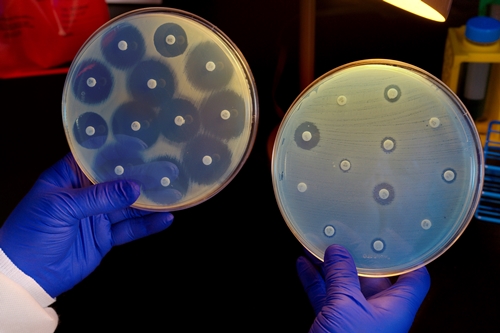7 July 2016. A spin-off company from University of Utah received funding to develop a new type of antibiotic that targets basic genetic functions of bacteria becoming resistant to conventional antibiotics. National Institute of Allergy and Infectious Diseases, part of National Institutes of Health, awarded the 2-year Small Business Innovation Research grant of nearly $600,000 to Curza Global LLC in Provo, Utah.
Antibiotic resistance continues to be difficult problem for clinicians and public health authorities, reaching a crisis stage in some parts of the world. Centers for Disease Control and Prevention says 2 million people in the U.S. each year contract infections from bacteria resistant to antibiotics, leading to at least 23,000 deaths. CDC considers it a high-priority problem, and allocated $160 million in the 2016 fiscal year to find solutions.
Curza Global, a 3-year old company, creates treatments for bacterial colonies called biofilms that provide support and protection for bacteria, making them difficult to eradicate. Its technology targets the mechanism called the ribosome that translates genetic codes from DNA into proteins in lower-level organisms like bacteria. The company licenses the research of University of Utah chemistry professor Ryan Looper and microbiologist Dustin Williams. Looper and Williams are vice-presidents of Curza Global, while maintaining their university affiliations.
The NIH grant funds development of Curza Global’s technology to proof-of-concept stage, providing evidence of its technical and commercial feasibility with gram-negative bacteria that include several drug-resistant strains. Gram-negative bacteria are associated with infections such as pneumonia, bloodstream infections, wound, and surgical site infections. “Gram” refers to a classification for bacteria where the microbes either retain (gram-positive) or shed (gram-negative) a test stain on their protective cell coatings.
Under the grant, Curza Global will test synthetic small-molecule, or low molecular weight, compounds that target the peptidyl transferase center in bacterial ribosomes that produces proteins needed for bacterial survival, and thus could not be bypassed through evolution. The company notes that its preliminary studies show their compounds address protein production only in lower organisms like bacteria, and not in cells from larger, more complex organisms.
Curza Global plans to build on its early work with tuberculosis bacteria, adapting techniques developed in the lab of Yale University chemist Tom Steitz, making it applicable to a wider range of bacteria. The work is expected to produce a basic structure for new drugs targeting bacterial ribosomes, as well as an initial set of compounds tested against a panel of gram-negative bacteria. The project also includes tests of absorption, distribution, metabolism, and excretion or ADME properties that define the activity of compounds in the body, toxicology screens, and determination of a maximum tolerated dose for early clinical trials.
Read more:
- Process Devised to Quickly Isolate Bacteria in Lab Samples
- Fast, Inexpensive Test for Water Bacteria Developed
- Electric Current Shown to Reduce Wound Bacteria
- Sensor Quickly Detects Bacteria in Wounds
- Allergan, AstraZeneca Partner on Drug-Resistant Bacteria
* * *


 RSS - Posts
RSS - Posts
[…] Small Business Grant Funds R&D on New Antibiotics […]